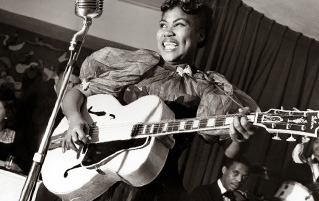5 Women Cut from Pop Culture History for Being Too Important

It's amazing to me how sick everyone is of talking about ladies, considering how rare it is for us to talk about actual ladies. I mean, specific people who happen to be ladies, rather than the abstract, intangible concept of "ladies" and lady-ness. "Ladies," we'll say, and then sit back and sip at our cappuccino/Scotch/Shirley Temple. "They sure are that thing they be. I wonder if it's possible for them to be funny or do math." Meanwhile, in the background, actual ladies with body-hair and smelly armpits and bad tempers are inventing computers and punk rock and, like, pies too probably (now I'm just listing my favorite things). And we were too busy nursing our Shirley Temples to even notice.
But seriously folks, there are a lot of women who basically redefined pop culture and never got the credit they were due. Until now, because I'm giving them credit. And I think they'd all agree that what I think is the most important.
Star Wars Sucked Until Marcia Lucas Fixed It
Like everything great, Star Wars came within an ass-hair's width of being total shit. You gotta remember that in the '70s anyone with a doofy beard and a plaid shirt could shoot a movie just by telling people what to do and not giving them the chance to disagree. It was a magical time.

Gayer! Gayer! I AM DRUNK WITH POWER!
But through George Lucas' devotion to an acid flashback he was apparently having for three straight weeks, when production wrapped, he found himself with a masterpiece of celluloid, right?
Nope! Turns out that the first cut of Star Wars was an incomprehensible mess, and it was up to George's wife and editor, Marcia Lucas, to swoop in and save the day ... again.
Actually, Marcia was Lucas' "muse" through the entire production, if by "muse" you mean "person who had all the good ideas." It was her idea to kill Obi-Wan (apparently George's first draft had him just disappearing at one point) and demanded that Lucas keep the "For Luck" kiss scene that would snarl the series up in a knotty mess of incest once the third movie was released. But, most importantly, she's totally responsible for the Battle of Yavin, also known as The Death Star Trench Run scene, also known as The Part at the End of the Movie Where the Good Guys Win.

If you don't immediately believe that editing can create tension in a scene, you can watch a re-creation of how the scene was scripted here, but I recommend railing some coke or something first to keep your attention span up. If you can't watch that because you're at work, the pre-Marcia version has Luke taking two full runs at the exhaust port, no appearance of ghost-Obi-Wan telling Luke to use the force, and -- worst of all -- Han scares Vader away from Luke like 45 freaking minutes before Luke takes his shot at the exhaust port, meaning that the only thing we're worried about happening in that scene is Luke missing and having to take the same shot for a goddamn third time. A pretty good rule for filmmaking is that if the biggest threat in your movie is the runtime, then the drama isn't really working.
Basically, without Marcia the movie never would've caught on as anything but another forgettable '70s schlock adventure with a better-than-normal soundtrack, but she was completely written out of Star Wars history by a messy divorce shortly after Empire Strikes Back was released (in fact, the production of Empire had been, in part, an attempt to save their marriage).
In a completely unrelated coincidence, no one made a good Star Wars movie ever again.
Lizzie Magie Invented Monopoly to Critique Big Business, Got Screwed by Big Business
Everyone knows the classic story of the invention of Monopoly. Haha, no they don't. That's ridiculous. But if you read the instruction manual or just Google the question, you get a pretty straightforward answer ...

And then you move on to more important stuff because you're a real person with stuff to actually take care of. In fact, you're so important that you didn't even notice the subtle part in those Google results that hinted at a deeper, richer story full of intrigue, mystery, and betrayal ...

The plot thickens!
Thirty years before Charles Darrow "invented" Monopoly, staunch anti-monopolist Elizabeth Magie created The Landlords Game, not as the fast-paced thrill-ride we know today, but as a piece of political commentary. There were two versions: one where you could be a monopolist and crush your opponents and another where everyone benefited when wealth was created. Of course, "fun" and "politically relevant" rarely overlap, and it turned out everyone preferred the more cruel version of her game. Darrow learned that version of the game from a friend and, being a cunning entrepreneur, turned around and sold "his" idea to Parker Brothers. When Parker Brothers found out that they didn't have a monopoly on Monopoly, they tracked down Magie and bought the idea from her for $500 -- which was less than she had spent developing and promoting it in the first place.
Turns out the creation of Monopoly was just like a game of Monopoly: complicated, longer than you expected, and in the end the biggest asshole won.
Sister Rosetta Tharpe Totally Invented Rock 'n' Roll, You Guys
The most fascinating thing about Sister Rosetta Tharpe isn't that she invented rock 'n' roll -- it's that nobody can admit it. Seriously, there's a whole documentary about her on PBS that clocks in at just about an hour, and throughout the whole thing, no one says she invented it. Sure, she "influenced" Little Richard, Johnny Cash, Elvis Presley, and Chuck Berry. And sure, she sang the words "rock me" while wailing on a sick electric guitar. And sure, she was doing all this in the 1930s and '40s while all the other alleged "inventors" of rock were still figuring out how to eat their own boogers. But no, at most, she's the "godmother" of rock. But she totally invented rock. First of all, look at her:

That image refuses to be saved as anything other than "Rock as Fuck.jpg." Go on. Prove me wrong. Do it. Do it, you coward. You can't.
Second, rock isn't just about the music, man, it's about the feeling. It's about doing your own thing and making your own rules in a world that doesn't understand you, and that's exactly what Tharpe did: Even though she sang gospel music, the religious establishment didn't understand her -- but teenagers did, making her one of the first musical super stars.
And yes, appealing to teenagers is my last point. That's a fundamental part of rock. Sorry, everyone-my-age-and-older, but rock is about being a mindlessly rebellious little shitlord, which is why every single important rock band in history started out by appealing to teens.
But, most important, the music she played was clearly rock 'n' roll. This is rock, cats and kittens. This is rock:
Or, as one commenter put it:

I rest my fucking case.
Alice Guy-Blache Invented Most of Movie-Making
Though film students will disagree, most people don't know a whole hell of a lot about who invented movie-making. It's such a collaborative process, and such a comparatively young art. You have Cecil B. DeMille over here making epics while Charlie Chaplin defined comedy and D. W. Griffith was inventing racism. But no matter how into movies you are, you've definitely never heard of Alice Guy-Blache -- even though pretty much every movie you've ever seen owes something to her.
As the head of production for Gaumont Film Company, she directed over 1,000 movies, among which are the first movies to have color:

Depicted here.
The first to feature sound:

Not depicted here.
And arguably the first fiction film ever made: She directed a fantasy story about a fairy plucking babies out of a cabbage patch in 1896, a few months after Georges Melies directed a story about two guys playing with a garden hose. So while she definitely made the first fantasy film, it may or may not count as the first fiction film, depending on how much the hose thing was scripted and how much thought was put into what they were trying to say.
As an upcoming documentary argues, her biggest contribution to the medium was making movies stick with the perspective of a single character rather than just relating a bunch of stuff that happened in the simplest possible terms, as well as encouraging more "natural" (less theatrically overblown) mannerisms on camera. You know how people in old movies move in huge, exaggerated motions, calling attention to everything they do like freaking robots? She helped bring about the end of that by plastering placards with the words "Be Natural" all around her set, bringing Konstantin Stanislavsky's "believability" acting style to cinema, and paving the way for dramatic "best actor/actress" clips every Oscar season.
F. Scott Fitzgerald Stole Everything From His Wife
F. Scott Fitzgerald and his wife, Zelda, were the early 20th century's version of Angelina Jolie and Billy Bob Thornton, or, for a more contemporary reference, Iggy Azalea and Harry Styles, whom I hear are dating. Right? Maybe? I actually just pulled two random celebrity names out of a hat, hoping to create a rumor. I don't even know what those people look like.

Oh.
The only difference between "Higgy" and "Zeff Scott" is that everyone always assumed that F. Scott Fitzgerald was the only artist in his relationship -- one contemporary writer even said, "Scott is a novelist, Zelda is a novelty," because women, you see, are things. Except it turns out that Zelda was actually responsible for a pretty big chunk of Scott's writing.
And not just in the sense that she was the inspiration for most of his female characters and that he plumbed her personal life and struggle with mental illness for his writing -- he actually stole her freaking diary entries and had them published. After Zelda was asked to write a review of F. Scott's The Beautiful and Damned for The New York Tribune, she recognized portions of her own diaries that had "mysteriously disappeared shortly after marriage" and concluded her review with "Mr. Fitzgerald -- I believe that is how he spells his name -- seems to believe that plagiarism begins at home." Things got worse later, when F. Scott started publishing Zelda's stories under his name.
Finally, Zelda got fed up with that shit and tried to publish her own book, Save Me the Waltz, based primarily on her super-fucking-crazy-ass marriage. But when Scotty found out, he flipped his shit and told her that their marriage was his material. He ended up forcing her publisher to cut out all the parts that he planned on using so he could cram them into Tender Is the Night while he crammed Zelda into a mental institution. But don't worry, this all ends happily: She died in a fire in that mental institution in 1948.
Shit -- "crappily." My notes say "this all ends crappily." I, um -- I have really bad handwriting.
JF Sargent is an editor for Cracked with a new column here every Tuesday. You can follow him on Twitter and Facebook, but those links go to the opposite place you expect because he wants to make sure you're paying attention.
For more from Sarge, check out 5 Ways Video Game Addiction is Ruining Gaming and 6 Snobby Claims That Science Has Officially Debunked.
Are you on reddit? Check it: We are too! Click on over to our best of Cracked subreddit.
